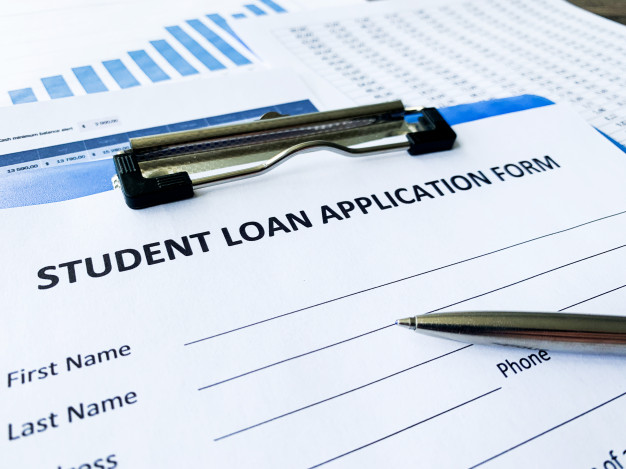
Once a year, usually in June, the government announces interest rates for federal student loans that will be first disbursed after July 1. Whether you’re a freshman or, say, a junior, these rates apply to the loans you get for the academic year that starts in the fall.
For the 2021-2022 academic year, rates are up almost 1%, compared to 2020-2021. Specifically, for Subsidized and Unsubsidized Stafford Loans to undergraduates, the rate is 3.73% (up from 2.75%). For Unsubsidized Stafford Loans to graduate or professional students, the rate is 5.28% (up from 4.30%). And for PLUS Loans to parents and graduate or professional students, the rate is 6.28% (up from 5.30%). Perkins Loans are set at 5%.
Federal student loan interest rates are determined differently than private student loan interest rates. Here’s what you should know about federal and private student loan interest rates in 2021.
Federal Student Loan Interest Rates for 2021-2022
As just noted, interest rates on federal student loans for the upcoming academic year are set by the government. By federal law, they’re based on the 10-year Treasury note auction in May. The rates set for the 2021 to 2022 school year are for loans first disbursed from July 1, 2021 to June 30, 2022.
• Undergraduate students borrowing Direct Subsidized Loans and Direct Unsubsidized Loans that are first disbursed for the 2021-2022 academic year, will pay a 3.73% interest rate for, up from 2.75% in the 2020 – 2021 school year.
• Graduate or professional students borrowing Direct Unsubsidized Loans that begin for the 2021 – 2021 school year will pay an interest rate of 5.28%, up from 4.30% the previous school year.
• Parents and graduate or professional students borrowing Direct PLUS Loans will receive a 6.28% interest rate for the 2021 -2022 school year, up from 5.30% the previous school year.
How Federal Student Loan Interest Rates Work
Interest rates on federal student loans are fixed for the life of the loan. That means that if you borrowed a Direct Subsidized Loan for the 2020 – 2021 school year, and your interest rate was 2.75%, that interest rate is locked in at 2.75% for the life of that loan.
But, if you qualify to borrow another Direct Subsidized Loan to pay for the 2021 – 2022 school year, your new loan will be disbursed with the 3.73% interest rate.
Since 2006, interest rates on federal student loans have fluctuated from anywhere between 2.75 to 8.50%, depending on the type of loan.
Difference Between Federal and Private Student Loan Interest Rates
Unlike federal student loans, interest rates for private student loans are set based on economic factors and underwriting unique to each lender that issues them. Lenders typically take into account a borrower’s credit history, earning potential, and other personal financial factors.
If you borrowed a private student loan, you may have applied with a cosigner to secure a more competitive interest rate. That’s likely because most college students don’t have much credit history or employment history, so interest rates on private student loans can be higher than those on federal student loans without a well-qualified cosigner.
While federal student loans have a fixed-interest rate, private student loans can have either a fixed or variable interest rate. Borrowing a variable rate loan means that the interest rate can change periodically.
How Private Student Loan Interest Rates Work
The frequency of changes in the interest rate will depend on the terms of the loan and on market factors; typically, private lenders adjust the interest on variable-rate loans monthly, quarterly, or annually. Interest rates on private student loans are typically tied to the London Interbank Offered Rate (LIBOR) or the 10-year Treasury yield.
So as the LIBOR changes, for example, interest rates on variable-rate student loans can change as well. Typically, lenders will add a margin to the LIBOR, which is determined based on credit score (and, the credit score of your co-signer if applicable).
Generally, the LIBOR tracks the federal funds rate closely. In June 2020, the Federal Reserve announced that it plans to keep the federal funds rate close to zero, likely through 2022.
This means that, so long as the federal funds rate remains low, the interest rates on private student loans are not likely to increase during that time period. However, it’s important to pay attention to interest rates, especially for borrowers with private student loans with a variable-interest rate, since these changes could cause fluctuations to the interest rate of the loan.
And given that LIBOR is scheduled to be discontinued around the end of 2021 , rates could change in other ways as new indices are chosen by lenders.
Lowering the Interest Rate on a Private Variable-Rate Loan
If you have a private variable-rate loan and are worried about interest-rate volatility, there are options available to protect against an interest-rate hike. One option is switching to a fixed-rate loan via student loan refinancing.
When you refinance your student loans, you take out a new loan (typically with a new lender).
The new loan effectively pays off your existing loans, and gives you a new loan with new terms, including a new interest rate. Private lenders, like SoFi, review personal financial factors like your credit and employment history, among other factors, to determine a new interest rate.
If you qualify to refinance, you’re then able to choose between a fixed or variable rate loan, so if you’re worried about rising interest rates in the future, you may have a chance to qualify to lock in a new (hopefully lower) fixed interest rate.
Monthly Payments and Private Loans
You should also have the opportunity to set a new repayment plan, either extending or shortening the term of the loan. If you extend your student loan repayment term, you’ll likely have lower monthly payments, but will pay more in interest over the life of the loan.
Shortening your repayment plan typically has the opposite effect. You may owe more each month, but will most likely spend less on interest over the life of the loan.
To get a general idea of how much refinancing your student loans could impact your repayment, take a look at SoFi’s student loan refinance calculator, where you can compare your current loan to current SoFi refinance student loan rates.
Refinancing Federal Student Loans
Federal student loans can be refinanced, too. Typically, a student wouldn’t do this while still in school, since the government is paying the interest on certain federal loans during this time. Also, federal student loan interest rates are generally lower than rates for private loans disbursed in the same time period.
It should be noted, however, that refinancing a federal student loan with a private lender means you’ll no longer be eligible for federal programs and protections like income-driven repayment, forbearance, or Public Service Loan Forgiveness (PSLF).
The Takeaway
Interest rates for federal student loans reset every year in June for the upcoming school year. For the 2021-2022 school year, rates are up roughly 1% compared to the previous year, which saw the lowest rates in years.
If you refinance your student loans with SoFi, there are no origination fees or prepayment penalties. The application process can be completed online, and you can find out if you prequalify for a loan, and at what interest rate, in just a few minutes.
Republished with permission by SouthFloridaReporter.com on June 28, 2021
SoFi Invest®
The information provided is not meant to provide investment or financial advice. Investment decisions should be based on an individual’s specific financial needs, goals and risk profile. SoFi can’t guarantee future financial performance. Advisory services offered through SoFi Wealth, LLC. SoFi Securities, LLC, member FINRA / SIPC . SoFi Invest refers to the three investment and trading platforms operated by Social Finance, Inc. and its affiliates (described below). Individual customer accounts may be subject to the terms applicable to one or more of the platforms below.
1) Automated Investing—The Automated Investing platform is owned by SoFi Wealth LLC, an SEC Registered Investment Advisor (“Sofi Wealth“). Brokerage services are provided to SoFi Wealth LLC by SoFi Securities LLC, an affiliated SEC registered broker dealer and member FINRA/SIPC, (“Sofi Securities).
2) Active Investing—The Active Investing platform is owned by SoFi Securities LLC. Clearing and custody of all securities are provided by APEX Clearing Corporation.
3) Cryptocurrency is offered by SoFi Digital Assets, LLC, a FinCEN registered Money Service Business.
For additional disclosures related to the SoFi Invest platforms described above, including state licensure of Sofi Digital Assets, LLC, please visit www.sofi.com/legal. Neither the Investment Advisor Representatives of SoFi Wealth, nor the Registered Representatives of SoFi Securities are compensated for the sale of any product or service sold through any SoFi Invest platform. Information related to lending products contained herein should not be construed as an offer or pre-qualification for any loan product offered by SoFi Lending Corp and/or its affiliates.
Crypto: Bitcoin and other cryptocurrencies aren’t endorsed or guaranteed by any government, are volatile, and involve a high degree of risk. Consumer protection and securities laws don’t regulate cryptocurrencies to the same degree as traditional brokerage and investment products. Research and knowledge are essential prerequisites before engaging with any cryptocurrency. US regulators, including FINRA , the SEC , and the CFPB , have issued public advisories concerning digital asset risk. Cryptocurrency purchases should not be made with funds drawn from financial products including student loans, personal loans, mortgage refinancing, savings, retirement funds or traditional investments.
Financial Tips & Strategies: The tips provided on this website are of a general nature and do not take into account your specific objectives, financial situation, and needs. You should always consider their appropriateness given your own circumstances.
External Websites: The information and analysis provided through hyperlinks to third party websites, while believed to be accurate, cannot be guaranteed by SoFi. Links are provided for informational purposes and should not be viewed as an endorsement.
Tax Information: This article provides general background information only and is not intended to serve as legal or tax advice or as a substitute for legal counsel. You should consult your own attorney and/or tax advisor if you have a question requiring legal or tax advice.[/vc_message]












